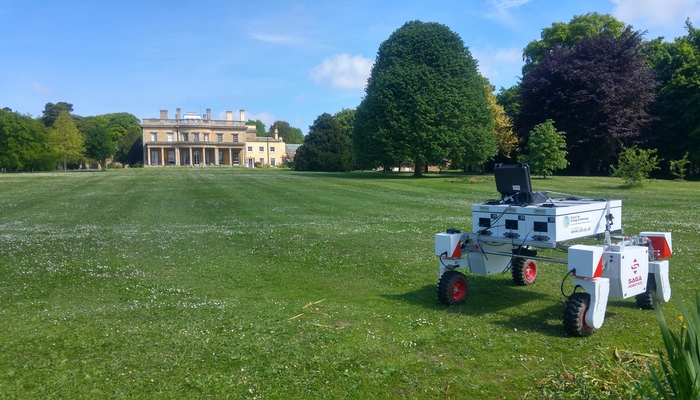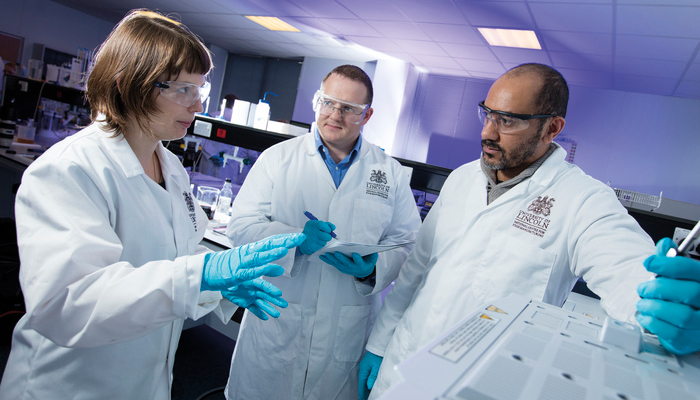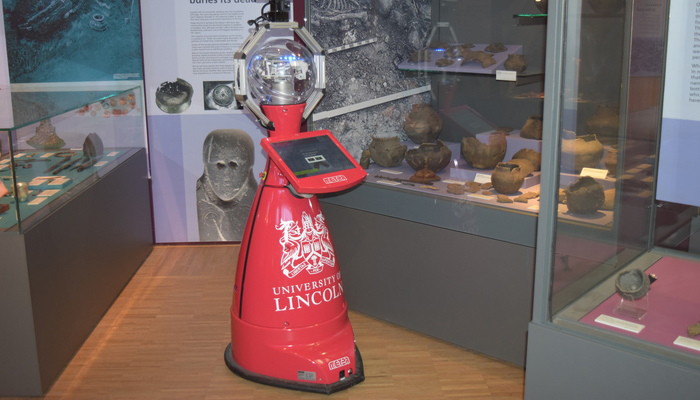Tackling climate change and reversing environmental degradation are among the most important tasks facing the world in the 21st century. University of Lincoln researchers are developing innovative solutions to the challenge of sustainability through inter-disciplinary research in key areas, including climate science, soils, evolution and ecology; water and planetary health; clean energy, energy usage and sustainable supply chains; and ecological justice.
The University has declared a climate emergency and is working with partners locally and globally on a range of short- and longer-term interventions to safeguard the future of our planet.

Lincoln Institute for Agri-Food Technology
The Lincoln Institute for Agri-Food Technology (LIAT) is a specialist research institute that aims to support and enhance productivity, efficiency, and sustainability in food and farming.
Researchers are engaged in the development of technologies which add value or solve challenges across the food chain. One of the Institute’s core aims is to connect academic expertise with partners in industry to pursue world class research and address real-world challenges, advancing state-of-the-art agri-food technology and improving the bottom line for businesses.
Lincoln Centre for Ecological Justice
The accelerating environmental degradation projected for this century, of which climate change, natural habitat loss, over-exploitation of resources and pollution are major drivers, will likely move many key natural systems beyond their capacity for resilience. We need to improve our understanding of how best to make the necessary changes in human and institutional behaviour to make a difference, which will require new forms of research, with new synergies from interdisciplinary, cross-scale research in law, the natural and social sciences, and the humanities.
The Lincoln Centre for Ecological Justice (LinCEJ) will lead and enable creative research that will do just that, delivering new understandings of the types of changes and governance measures needed to turn the Anthropocene from an era of high risk for society and the environment to one in which the needs of all are met on an equitable basis.


Lincoln Centre for Water and Planetary Health (LCWPH)
The Lincoln Centre for Water and Planetary Health focuses on solving the most pressing global environmental and societal problems emerging from the world’s largest rivers.
The group's specialisms include climate change impacts on extreme floods and droughts, flood-related contamination from metal mining and processing, and water-borne and vector-borne diseases affecting humans and animals.
National Centre for Food Manufacturing
The National Centre for Food Manufacturing is committed to helping the food sector innovate, working with employers and partners to support the food sector's growth and meet the challenges of the future.
Core research areas include robotics and automation, food safety and microbiology, advanced food processing technologies, and food supply chain development, reflecting the priorities of the food manufacturing sector.


Lincoln Centre for Autonomous Systems Research (L-CAS)
The Lincoln Centre for Autonomous Systems Research specialises in technologies for perception, learning, decision-making, control, and interaction in autonomous systems, especially mobile robots and robotic manipulators.
Areas of application include agri-food, healthcare, intelligent transportation, logistics, nuclear robotics, service robotics, and space robotics.

Research Centre for Computational Physics
The Research Centre for Computational Physics undertakes research encompassing computational and theoretical physics as well as applied mathematics of nano-structured soft matter, solid/soft matter interface, molecular biophysics, and biologically inspired systems.

Autism Research Innovation Centre
The Autism Research Innovation Centre (ARIC) is focused on strengthening the wider autism community through participatory action research. ARIC’s mission is to create a diverse and inclusive environment where community knowledge and academic expertise merge to produce evidence-based innovative professional approaches and services for enriching the lives of autistic people and those who support them throughout their lifespan.
We work to develop, evaluate, and cultivate evidence-based initiatives and protocols to strengthen the connection between autistic people and those supporting them.
Related Research Institutes, Centres, and Groups
Lincoln Centre for Autonomous Systems (L-CAS)
Lincoln Centre for Ecological Justice
Lincoln Centre for Water and Planetary Health (LCWPH)
Lincoln Climate Research Group
Lincoln Institute for Agri-Food Technology (LIAT)
Lincoln Soils Research Group
National Centre for Food Manufacturing (NCFM)
Research Centre for Computational Physics
Sustainable Built Environments
Sustainable Energy and Power Systems
UNESCO Chair







